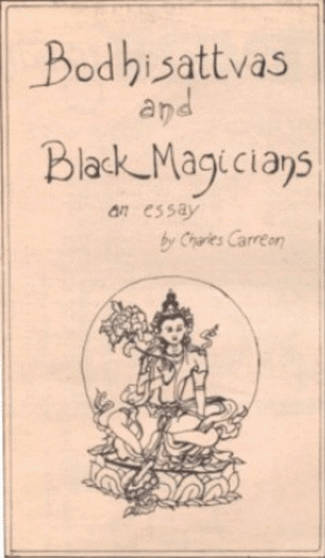
[Perhaps one can never recapture the splendor of one's youth, but when I read this naive essay, crafted no doubt in the midst of some icy winter, marooned in the middle of a field of mud and frozen teasle, living in a house made with your own hands, and those of your wife, tending little kids who never-endingly have to shit in the outhouse that is no short walk away in the driving rain, then I know what folly is. There, nurturing literary illusions, did I find myself, a noble essayist for "More Than Food," the literary organ of the august body known as Ashland Community Food Store. From such a sturdy soapbox did I proclaim my outhouse sutra.]
I. Love
If we examine our closest relationships, we will see how far they remain from any sort of total devotion or love. No matter how "much" we love someone, we still are capable of turning it off or on, depending on our mood or their behavior. This is because we "love" people as long as it serves our purposes. We "love" in order to manipulate them. We rarely conceive of expanding our love around others as a nurturing, allowing space. We keep our love inside, and control the flow in accordance with what we wish to effect upon others. This can even be considered very sophisticated and clever, but actually it is quite sterile. At this point "love" has become a medium of exchange, and the more we "love" someone in this way, the more they are in our debt. If we are discommoded by the behavior of someone we "love," we feel as if we are extending credit upon which we shall collect in due course.
Exchange oriented loving arises because love does indeed have great value. It is the most valuable thing we can possess. Ah, there's the rub. For we believe we can possess it. But love is not possessable. It is the wealth of a heart that has no gates or walls, no inside or outside. As soon as we regulate the flow of our affection, it becomes something a little different. It is no longer the pure and delightful substance it was. It still has value, but its value is now relative. We can use it to buy what we need, like dollars, but, like dollars, the value is ascribed rather than intrinsic. A dollar has not the loveliness of gold, or a diamond, nor does it contain nourishment as does a slice of bread. A dollar, by itself, without a government behind it, is nothing but a rather ugly piece of paper. It is of no use to the possessor if there is nothing to exchange it for. This is why regulated, conditional love does not nourish the one who gives it. It is also frustrative to the receiver, for it is never total, like a river flowing to the sea without restraint. It is rather a spigot which can easily be switched off. Pure love never has this quality of holding back or controlling. It is as vast as the sea, as unchanging as the sky. You cannot hold it or use it for selfish ends, but it nourishes the whole universe.
II. Growth
The saddest thing about the human condition is that this completely perverse state of affairs is taken as normal. A person who transcends these boundaries is either a fool or a saint. In most spiritual traditions there is the notion of a "transmission of wisdom" which comes from the enlightened source, and transforms the very basis of the aspirant, making possible a relationship with life which was previously unreachable.
What is often not mentioned is why this transmission is necessary. Why do we need a key to unlock the door to our hearts, if the nature of love and openness is unobstructible. The reason seems to be that humanity as a whole is also the keeper of a certain esoteric tradition. Unfortunately this tradition is more after the manner of a black art. The members of this cult are all our fellow beings in delusion, recognizable by the veil which cloaks their eyes and the shield which covers their hearts (and other soft spots). Together we perpetuate upon each other and upon our children a transmission of ignorance. There is no doubt that this cult uses brainwashing and coercive techniques, but all these things may be forgiven them, for at heart "they know not what they do." "They know not." We know not. To not know is ignorance, and ignorance is the path of the unfree.
When the ignorant initiate others into ignorance it must of necessity be a sort of spooky thing. "There is something which it is dangerous to know." "Do not look behind that door." "Here's your blindfold. Don't take it off or you'll go insane." If you ask why you cannot know, or the door cannot be opened, the blindfold removed, you hit a rut of circular reasoning, a blind reliance on authority and tradition, or a semi-rationale propped by assumptions which are no more sound than the attitudes they claim to support. And all of this, of course, because, since the unexplored territory is forbidden, the authorities, on the one hand, cannot have knowledge of it, and explorers on the other hand, may often have to operate in secret. So the aggression of these black magicians of stupidity makes the situation even stickier. And as long as we shore up our shortcomings by means of aggression, protecting ourselves from openness by means of obstinate close-mindedness, we too are black magicians.
When one of these unfortunate sorcerers of stupidity begins to become disgusted with the dark and delimited environment of ignorance, the process of transmutation may have begun. Most likely, he will begin to seek others with a similar attitude, and perhaps will in time meet with a white magician. The white magician is an unveilment of possibility. His openness is extraordinary, and, to the aspirant, he seems to see things that are "invisible." The first thing this luminous sorcerer will do is to make the potential pupil aware of the fact that he is still carrying arms and protective gear. He will explain that it is impossible to learn the way of the white magician when one is still involved with defense of self. If the pupil can learn to dispose of his weapons, it may be possible for him to begin the path of unveilment.
So here we have the picture of a true beginner. Such a person still may not see very well, but they have lain down their weapons and are working on freeing themselves of their armorplate. They do not fight to preserve their delusion. They may even gain a certain sense of dignity, of decorum, because their humility and openness makes them more magnanimous, less petty. Since they do not constantly have to attend to myriads of defensive mechanisms , they develop a stillness, a sense of composure that is quite dignified. On the other hand, they are aware of their limitations, and do not try to do more than they can. Because they realize their state of partial blindness, they do not move too impulsively, lest they bump into something. Because of this they work right with a situation, closely and precisely. There is a complete lack or arrogance, since such a person is always aware of the fact that they are beginners.
Slowly such a person's vision gradually improves. The self-interest that clouds over situations is seen more and more dispassionately. Eventually, they can reach a stage where they cut down self-interest mercilessly the instant it appears. The Buddhist tradition of the Mahayana characterizes such a person as a Bodhisattva -- a hero of light. Lao Tzu says, "The sage has no mind of his own -- he is aware of the needs of others." and, "By selfless action, the sage achieves fulfillment." When this style of action becomes firmly established, the aspirant is becoming a white magician, but does not notice it. From their point of view, they simply are living in an open environment which they take to maintain in its original state. There is no possibility of exhaustion or weariness, because there is no attachment to standards of achievement or progress. It is a situation of knowing one's job and doing it well.
As the handling of energy becomes increasingly fluid and spontaneous, the magician is less and less hindered by the limitations of self-impurities. As wisdom dissolves all apparent dualities, which are increasingly subtle, the practitioner moves toward the level of a siddha -- an Accomplished One, able to play with paradoxes and contradictions skillfully without being burned or entangled. No mere cleverness is involved here, but a real mastery of the elements of consciousness, and hence, matter. Such a master bends all his power to the service of fellow beings, and thus develops space to a level of keen precision, imbuing it with a quality of crystalline luminosity. The wisdom of such beings is so penetrating and incisive that it takes cuts on the armor of ego that cannot be healed. Likewise it is able to mend the fragmentation of mind with such skill that it will never again give way to the forces of chaos. It is said that the Siddhas use the power of chaos itself to destroy it, short-circuiting the elaborate weapons system of the self.
Beyond this level it is impossible to describe the vastness of such compassionate activity. It has been called "Light Everywhere." Such activity is as purposeless and effective as the power of the radiant sun, as unshakeable as infinite space, as supportive as the fertile earth. Bodhisattvas and novice white magicians grow on this vast expanse like numberless blades of grass, as rusting swords and moldering armor fertilize the rich soil.
Afterword: I am indebted to Carlos Castaneda for relaying Don Juan's description of our fellow men as deluded black magicians, and to the Venerable Chogyam Trungpa Rinpoche for his vivid descriptions of the Buddhist path. Also, for those who may be interested in seeing a teacher who is said to have achieved the level of "Light Everywhere," be sure to watch for the visit of His Holiness Dudjom Rinpoche, the head lama of the Nyingmapa tradition of Vajrayana Buddhism.
(May, 1980, Issue 20, "More Than Food," Ashland, Oregon)



